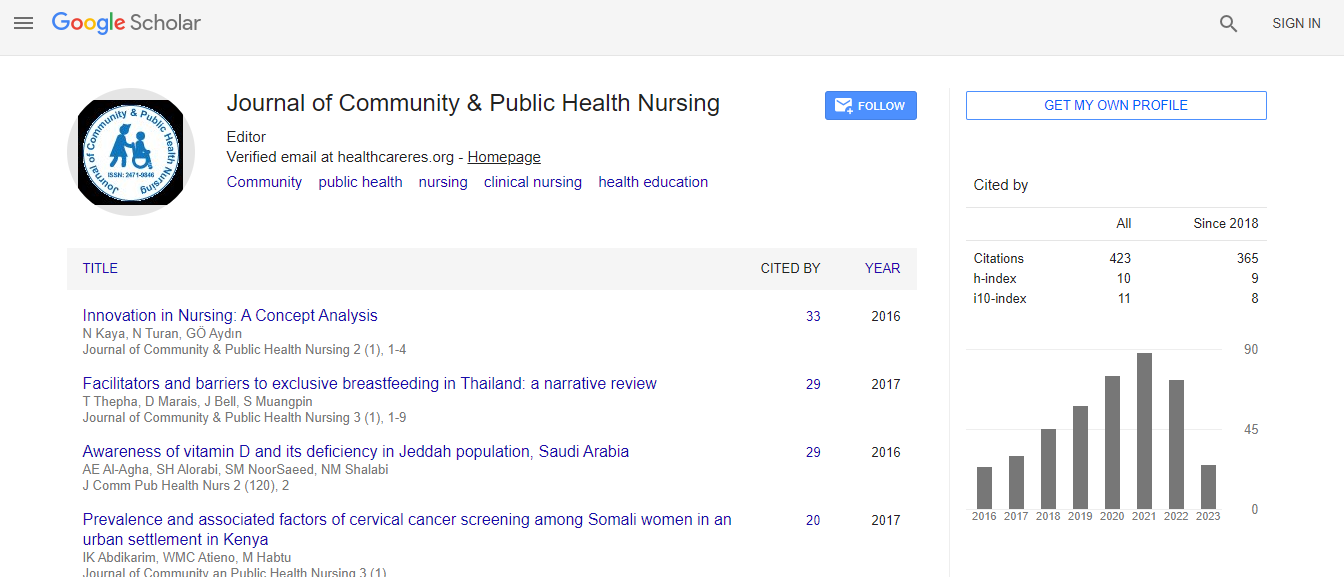Our Group organises 3000+ Global Conferenceseries Events every year across USA, Europe & Asia with support from 1000 more scientific Societies and Publishes 700+ Open Access Journals which contains over 50000 eminent personalities, reputed scientists as editorial board members.
Open Access Journals gaining more Readers and Citations
700 Journals and 15,000,000 Readers Each Journal is getting 25,000+ Readers
Google Scholar citation report
Citations : 739
Journal of Community & Public Health Nursing received 739 citations as per Google Scholar report
Journal of Community & Public Health Nursing peer review process verified at publons
Indexed In
- Google Scholar
- CiteFactor
- RefSeek
- Hamdard University
- EBSCO A-Z
- OCLC- WorldCat
- Publons
- Geneva Foundation for Medical Education and Research
- ICMJE
Useful Links
Recommended Journals
Related Subjects
Share This Page
Identifying disparities in the wishes of non-cancer elderly patients and their families when making decisions for the end-of-life period: From observations of experienced visiting nurses
7th International Conference on Public Health and Nursing
Madoka Okazaki
Sapporo Medical University, Japan
Posters & Accepted Abstracts: J Comm Pub Health Nurs
Abstract
Statement of the Problem: Currently, Japan is facing the challenges of a rapidly aging society with increasing numbers of the elderly suffering from chronic diseases and dementia. Here the Japanese government has adopted policies to promote home care in preparation for an age with many deaths. The author has been engaged in research to develop a family support program useful for end-of-life home care for non-cancer elderly patients. The number of deaths at home accounts for 10% of the total deaths in Japan although 60% of the elderly wish to die at home. Previous studies have reported that one reason for this disparity is because wishes of the family tend to be prioritized over those of the elderly. However, no studies have identified the conditions where there is a disparity in the wishes of the two sides. Aim: This study aims to establish details of decisions where the wishes of non-cancer elderly patients and their families differ, as well as the background to the wishes for the end-of-life period. Methodology: Semi-structured interviews were conducted with eleven experienced visiting nurses. The recorded data was used to identify details of the disparities between wishes and classified by the similarity and differences expressed. The study was conducted with the approval of the ethics review committee. Findings: The disparities in wishes were mainly about where to die and whether to receive medical treatment. The patients preferred to die at home and not receive treatment but the family preferred them to be hospitalized and receive treatment for various reasons. Conclusion & Significance: The findings suggest the importance for visiting nurses to understand the background thoughts of non-cancer elderly and their families and to be able to propose ways for both parties to reach agreement, rather than giving priority to either.Biography
Madoka Okazaki has worked as a Visiting Nurse in Japan and is currently working as an Assistant Professor at the Department of Nursing, School of Health Sciences, and Sapporo Medical University. Her research themes are end-of-life care for elderly patients at home and their families, as well as in-service education to improve practical nursing skills of visiting nurses.
E-mail: madoka@sapmed.ac.jp

 Spanish
Spanish  Chinese
Chinese  Russian
Russian  German
German  French
French  Japanese
Japanese  Portuguese
Portuguese  Hindi
Hindi 
